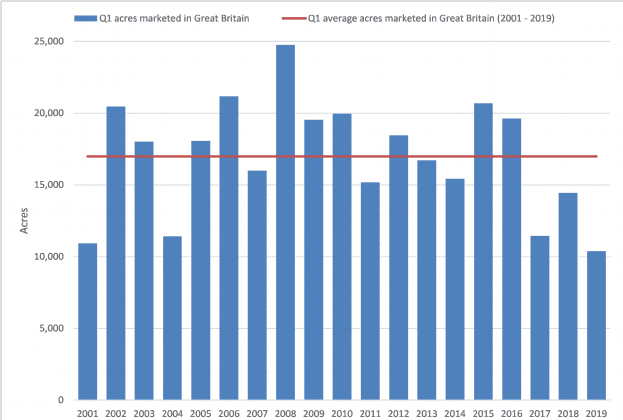Q1 2019 Farmland – a shortage of acres but a good book of prospective buyers
17 April 2019
Alex Lawson, Savills farm agency, comments, “The market in the first quarter of any year tends to be relatively small as most sellers prefer to wait and launch their property in the spring.
“Since 2000 the first quarter of any year has averaged just under 17,000 new acres to the market, but this year, just 10,400 acres so far across Great Britain has been publically marketed. This is the lowest acreage recorded since our analysis began in 1995.”
The supply in the first quarter of this year was 28% less than in the first quarter of 2018 and 40% lower than the average since 2000. Indeed, there have only been four years since 2000 when the area marketed in the first quarter was less than 12,000 acres.
Ian Bailey, Savills rural research, comments, “With very little activity and consequently little transactional evidence, it is no surprise that our Farmland Value Survey has recorded very little movement in average values since the end of last year.”
Our research shows that depending on location, average values have remained stable at around £7,500 to £8,800 per acre for prime arable and £5,500 to £7,000 per acre for average quality grassland. We are predicting that these average values will remain relatively stable throughout the year as there are plenty of buyers registered.
Premiums are likely to be paid for top quality properties, where demand is strong and forward looking farming businesses are looking to expand existing operations and roll-over investors are looking for new opportunities. Meanwhile, non-farming buyers are looking to invest away from riskier asset classes and there is a rise in interest for amenity property.
In Scotland, some of the strongest bids are from those looking to purchase agricultural land for new woodland creation projects. These projects are supported by Government targets and can benefit from grant funding.
Alex continues, “Undoubtedly there are some significant challenges ahead for farming businesses but until the future farming policy is ratified, it is difficult to forecast how the farmland market might be affected. It is however very clear that despite the wider economic uncertainty there is still appetite for well diversified or high quality commercial farming businesses and the best amenity estates.”
General Enquiries
+44 (0) 79 6755 5817


.jpg)